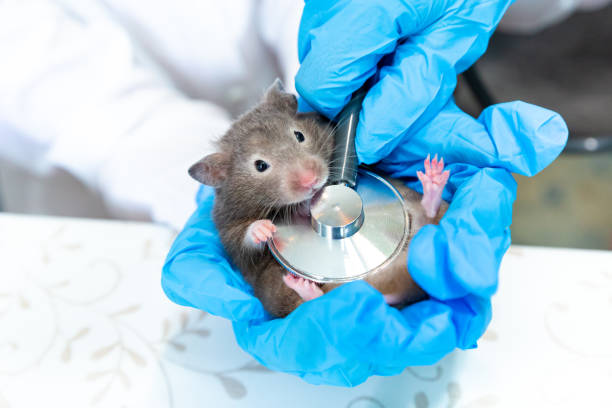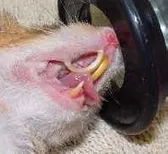
With regular handling, hamsters are very friendly and inquisitive, each with its own unique personality. They are rarely ill except when very old and ready to leave us but there are a couple of diseases you should be especially aware of:
Wet Tail
This is a very dangerous illness – it is severe diarrhoea accompanied by a wet rear end and ulceration of the bowels. It is imperative you seek the advice of a vet if you suspect wet tail as it is fatal if not treated. Even with treatment, many hamsters do not survive and it can be better to have it put to sleep rather than see it suffer.
Colds
Hamsters can catch human colds so try and avoid close contact if you have one.
Blocked Scent Glands
Hamsters have a scent gland on either hip, often mistaken for a scab by first time owners. These scent glands are used to mark territory and attract mates and can get more prominent when hamsters are on heat. In general, it is best to treat these like you would a mole on your own skin; check them every time you play with your hamster and if they become blocked, swollen, weepy or change drastically in appearance see a vet.
Tyzzer’s Disease
This is a disease carried by wild mice. The hamster rapidly deteriorates and dies. Do not store your hamster products (or hamster!) in places like sheds or garages. Mice can contaminate food, cages, shavings and bedding, even before you buy these products so make sure you buy from a reputable and clean pet shop.
Abscesses
These are soft pus filled swellings, often caused by bites, scrapes or foreign bodies getting under the skin. If your hamster has an abscess, clip the fur around the wound and bathe the animal daily in a lukewarm salt solution (one teaspoon of salt to one pint of water) making sure you keep the head out the water. Keep the fur short until the pus has drained away and the skin flattens again. If you are not confident about doing this or if there are no signs of improvement after two or three days see your vet as antibiotics may be required to treat a bacterial infection or it may be something more serious such as cancer.
Overgrown Teeth
 Hamster’s teeth, like other rodents, grow constantly and need to be worn down by gnawing. Make sure you provide your hamster with something to gnaw, hard dog biscuits are ideal. If your hamster stops eating or is not eating as much check its teeth to make sure they are not overgrown or misaligned. The picture shows overgrown teeth – this much overgrowth needs to be treated by a vet under anesthetic, otherwise, teeth clipping is simple to do at home and your vet can show you how to do this.
Hamster’s teeth, like other rodents, grow constantly and need to be worn down by gnawing. Make sure you provide your hamster with something to gnaw, hard dog biscuits are ideal. If your hamster stops eating or is not eating as much check its teeth to make sure they are not overgrown or misaligned. The picture shows overgrown teeth – this much overgrowth needs to be treated by a vet under anesthetic, otherwise, teeth clipping is simple to do at home and your vet can show you how to do this.
Hair Loss
Hair loss can have many causes including skin infections, mites and stress. If your hamster is losing hair see your vet for diagnosis and treatment as soon as possible.
If you suspect your pet is sick, call your vet!
Although we’ve mentioned a few possible treatments, it’s always best to seek professional help. We always recommend seeing your vet for any health-related issues your furry friend might have.